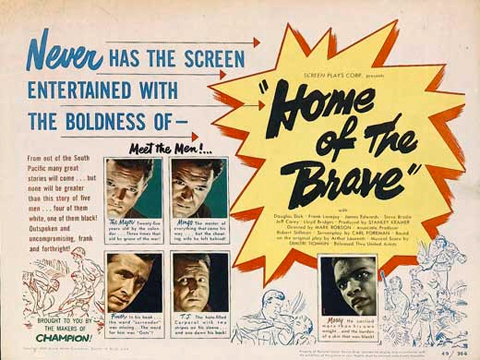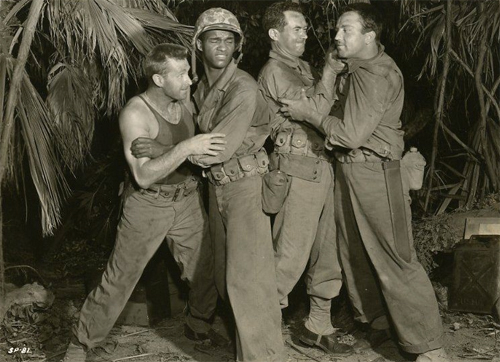| Reviews & Columns |
|
Reviews DVD TV on DVD Blu-ray 4K UHD International DVDs In Theaters Reviews by Studio Video Games Features Collector Series DVDs Easter Egg Database Interviews DVD Talk Radio Feature Articles Columns Anime Talk DVD Savant Horror DVDs The M.O.D. Squad Art House HD Talk Silent DVD
|
DVD Talk Forum |
|
|
| Resources |
|
DVD Price Search Customer Service #'s RCE Info Links |
|
Columns
|
|
|
Home of the Brave

Please Note: The stills used here are taken from promotional materials and other sources, not the Blu-ray edition under review.
The Movie:
World War II actioner, psychological drama, buddy flick, progressive if overly earnest "message picture" - 1949's Home of the Brave juggles several things at once. It hasn't lost its potency, however, in dealing with racism-induced guilt and shame that a black WWII soldier experiences over his missing comrade. The gritty drama arrives on Blu Ray and DVD as part of Olive Films' excellent re-releases of lesser-known titles from the Paramount Pictures back catalog.
The independently-produced Home of the Brave works on two levels - as tense wartime action, and as small-scale drama. While its sometimes hokey earnestness falls squarely in line with the other topical projects of producer Stanley Kramer (Judgement at Nurenberg; Guess Who's Coming to Dinner), the high-quality acting and script ultimately makes it a memorable piece. Seen today, the most notable thing about Home of the Brave is that it portrays an African-American character who is flawed yet dignified - and completely stereotype-free, a rarity in the '40s. That character, a traumatized soldier named Moss, is dynamically brought to life by actor James Edwards.
The racially charged drama fueling Home of the Brave comes in the aftermath of a top-secret reconnaissance mission for a group of World War II Army men stationed in the South Pacific. The camp's doctor (Jeff Corey) investigates one of the injured soldiers, who came back from the dangerous trek unable to speak or walk. Through flashbacks, we learn that the mission was organized by Robinson (Douglas Dick), a young major ordered to pull the team together at the last minute. Robinson's idealistic subordinate Finch (Lloyd Bridges) immediately signs up, while Corporal T. J. Everett (Steve Brodie) and Sergeant Mingo (Frank Lovejoy) go in with strong reservations. An outside topography expert is brought in to help, Peter Moss (Edwards), an African American soldier who - as it turns out - is an old college buddy of Finch's. Moss' presence causes tension for the bigoted T. J. and his friend Mingo, but the group doggedly continue the mission even while being ambushed by Japanese soldiers. The enemies' capture of Finch severely traumatizes Moss, whose guilt is compounded by the inferiority complex he's burdened with owing to his skin color.
Although it gets somewhat heavy-handed at times and sports a too-tidy ending, Home of the Brave's story packs a lot of punch (and it's still shocking to hear the n-word spoken on screen, as it is here). Director Mark Robson used his experience on Val Lewton's RKO horror b-movies to make this film a gritty, spare experience with strong, economic storytelling. Despite being adapted from a wordy stage play, it moves fluidly and never feels claustrophobic. On stage, Home of the Brave was only a modest stage success for Arthur Laurents (Rope). In adapting it for the screen, producer Stanley Kramer went with a different screenwriter (Carl Foreman, who also penned the tasty 1950 melodrama Young Man with a Horn) and decided to change the Moss character from Jewish to black. That was actually a sound decision, since it makes the final film a unique vehicle for a talented black performer. James Edwards may lack the intensity of Sidney Poitier, but his vulnerability as Moss holds up against his more experienced co-stars (who are also excellent). It's also interesting to note that the film's depiction of the strong feelings Moss has for Lloyd Bridges' Finch come across like an unrequited homosexual crush, although the filmmakers probably didn't intend it. When the openly gay Laurents was asked if Moss was written as being sexually attracted to Finch, he admitted that the thought never entered his mind at the time.

The Blu Ray:
Video
The 1.33:1 image on Olive Films' Blu Ray edition of Home of the Brave is mastered from a finely detailed if raggedy-appearing print. The unrestored image sports a good amount of dust and white specks, while light levels contrast more noticeably than what would be seen on other '40s-era films reissued by Olive. Decent enough for a 65 year-old film, just don't expect a stunning visual presentation.
Audio
The film's decently mixed mono soundtrack is the sole audio option. The film tends to get raggedy sounding during louder passages (when Dimitri Tiomkin's score is at its most bombastic), but otherwise it's a standard, not too objectionable listen. No subtitles.
Extras
None.
Final Thoughts
A thoughtfully made "message picture" from producer Stanley Kramer, director Mark Robson, and playwright Arthur Laurents, Home of the Brave addresses racial inequality in a progressive, realistic manner. Although the Blu Ray format doesn't do an average-looking film like this any favors (the DVD edition will suffice), this penetrating WWII drama counts as one of the more fascinating obscurities released by Olive Films. Recommended.
Matt Hinrichs is a designer, artist, film critic and jack-of-all-trades in Phoenix, Arizona. Since 2000, he has been blogging at Scrubbles.net. 4 Color Cowboy is his repository of Western-kitsch imagery, while other films he's experienced are logged at Letterboxd. He also welcomes friends on Twitter @4colorcowboy.
|
| Popular Reviews |
| Sponsored Links |
|
|
| Sponsored Links |
|
|
| Release List | Reviews | Shop | Newsletter | Forum | DVD Giveaways | Blu-Ray | Advertise |
|
Copyright 2024 DVDTalk.com All Rights Reserved. Legal Info, Privacy Policy, Terms of Use,
Manage Preferences,
Your Privacy Choices | |||||||













